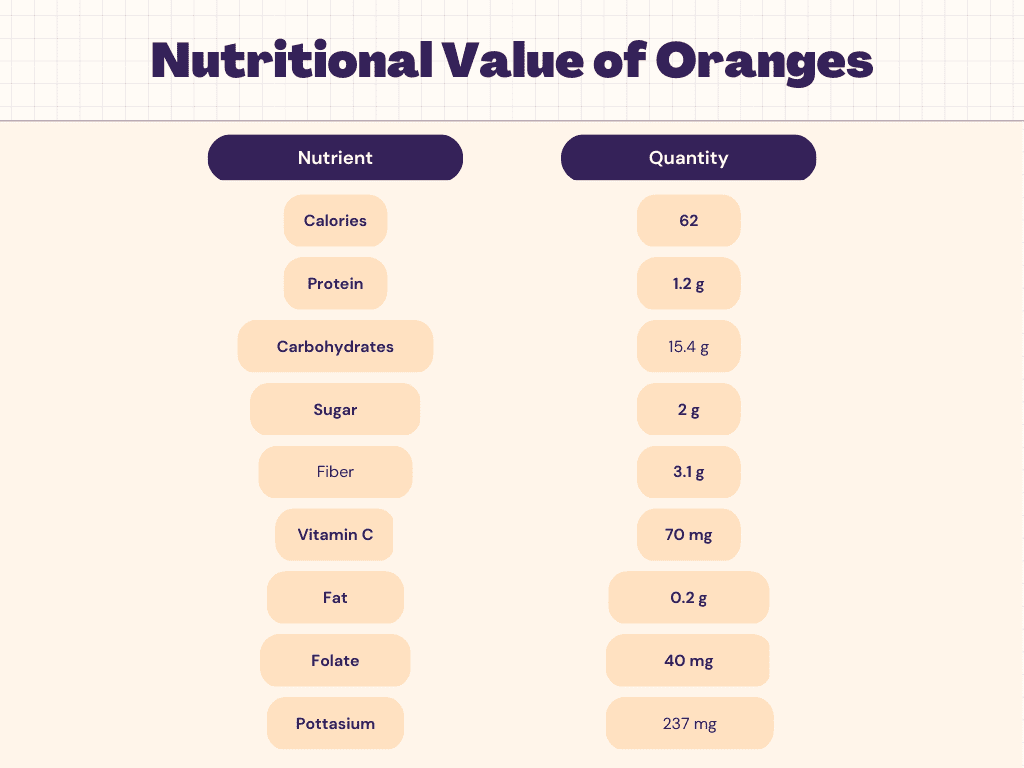Oranges are a treasure trove of nutrients and protective plant compounds, including vitamins, minerals, and antioxidants. Research shows that regular consumption of oranges can benefit your health in several ways. The major ingredient – Vitamin C, which is essential for our body to stay healthy, not only strengthens our immune system but is also an important antioxidant that protects our body’s cells from internal and external damage. Vitamin C is associated with a reduced risk of colon cancer, asthma, osteoarthritis, rheumatoid arthritis, and many others. Vitamin C also prevents colds and frequent ear infections.
Nutritional Value of Oranges
Nutritional Facts of Oranges
Carbs
One navel orange (10 g) contains 73 calories and 16.5 grams of carbohydrates. Remember that larger portions contain more calories and carbohydrates. Although the carbohydrates in oranges come from simple sugars, whole oranges are also a good source of fiber and contain no added sugar.
Fats
Oranges contain almost no fat and are cholesterol-free.
Protein
Oranges contain minimal protein. You should also include other sources of protein in your diet to meet your daily needs.
Calories
One medium orange (15g) contains 73 calories, of which 91% come from carbohydrates, 7% from protein, and 2% from fat. An orange contains fewer calories than orange juice.
Health Benefits Of Oranges
Helps in weight loss – Oranges help keep your daily calorie intake low. These fruits have 2.
grams of fiber per 100 grams. One orange is an excellent source of fiber to meet your daily needs, as it weighs an average of 18 grams. Additionally, the fiber content can fill you up when you eat an orange before a meal, helping you consume smaller portions of food. Check our Weight loss Plans
Beneficial for Diabetic Patients – Because oranges have a low GI, they cause a slow rise in blood sugar, making them more suitable for diabetics. However, GI should not be the only factor you consider when monitoring your blood sugar. Check our Diabetes Plans.
Helps in dealing with PCOS – Those with polycystic ovary syndrome (PCOS) may benefit from eating oranges due to their low glycemic index. In addition to helping with PCOS, oranges reduce insulin resistance. Besides being delicious, they are also beneficial for human health due to the antioxidants they contain. Check our PCOS Plans.
Helps with Thyroid – Rich in vitamin C and antioxidants, oranges can neutralize free radicals and protect your cells from further damage. Free radicals cause inflammation of the thyroid gland and can affect its function. Check our Thyroid Plans.
Vitamins & Minerals in Oranges
Oranges are an excellent source of vitamin C, containing more than a day’s worth of this immune-boosting nutrient in one serving. Oranges also provide bone-strengthening calcium, potassium, and B vitamins, thiamine (B1), and folate (B9). A medium orange contains more than half the potassium of one medium (118 g) banana.
The Bottom Line
Oranges are fiber-rich fruits that provide plenty of vitamin C and potassium. Whole oranges are a nutritious source of carbohydrates, but they provide minimal amounts of fat and protein. The good news is that oranges are naturally low in calories and high in fiber, which is essential for weight loss. In addition, according to the study, choosing foods rich in fiber is associated with a lower weight. They make you feel fuller for longer and reduce the desire to eat more.
FAQs
How many Oranges can I eat in a day?
You can consume one orange every day – in the morning, in the evening, or after training. Or add fruit to your diet in other ways. Add slices of fruit rich in vitamin C to the salad. If an adult consumes oranges in large doses, such as -5 oranges per day, the excess fiber can cause stomach irritation, cramps, diarrhea, bloating, and nausea. Also, excessive consumption of vitamin C can cause heartburn, headaches, vomiting, and even insomnia.
Should I eat an Orange before or after exercise?
Oranges are good choices for a quick pre-workout snack. These different options will help give you the energy you need, as eating fruit before exercise is a very effective way to improve performance.
What are the benefits of Oranges?
- Helps in promoting Heart Health
- Helps in lowering Blood Pressure
- Helps in lowering the risk of Cataracts
- Helps prevent Birth Defects
- Protect your cells from damage.
- Helps your body produce collagen, a protein that heals wounds and makes the skin smoother.
- Promotes iron absorption against anemia.
- Strengthens your immune system, your body’s defense against bacteria.
What is the best time to eat an Orange?
To absorb all the nutrients contained in oranges – and this applies to all other fruits – it is best to eat them on an empty stomach, i.e. in the morning for breakfast, after rest, or an overnight fast, or as a snack between main meals.










